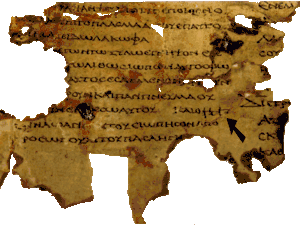Kaige revision
The kaige revision, or simply kaige, is the group of revisions to the Septuagint made in order to more closely align its translation with the proto-Masoretic Hebrew.[1] The name kaige derives from the revision's pervasive use of Koinē Greek: και γε [kai ge] ("and indeed") to translate the Hebrew: וְגַם [wə gam] ("and also"). The importance of this revision lies in its status as a precursor to later revisions by 'the Three' (i.e., Aquila, Symmachus and Theodotion) as well as the light it sheds on the origins of the Septuagint.[2]

The individual revisions characteristic of kaige were first observed by Dominique Barthélemy in the Greek Minor Prophets Scroll from Nahal Hever.[3]
Ellis R. Brotzman (retired professor of Old Testament at Tyndale Theological Seminary) and Eric J. Tully (assistant professor of Old Testament and Semitic languages at Trinity Evangelical Divinity School) claim that a characteristic of the kaige translation is that it wrote YHWH in paleo-Hebrew script instead of translating it into Greek.[4] When referring to kaige recension in 8HevXII gr, Kristin De Troyer makes the following affirmation: "The problem with a recension is that one does not know what is the original form and what the recension. Hence, is the paleo-Hebrew Tetragrammaton secondary – a part of the recension – or proof of the Old Greek text? This debate has not yet been solved."[5]
See also
References
- Dines, Jennifer Mary (2004). The Septuagint: Understanding the Bible and Its World. London: A&C Black. p. 81-82. ISBN 9780567084644.
- Law, Timothy Michael (2013). When God Spoke Greek: The Septuagint and the Making of the Christian Bible. Oxford: Oxford University Press. p. 76. ISBN 9780199344338.
- Tov, Emanuel (2011). Textual Criticism of the Hebrew Bible. Minneapolis: Fortress Press. p. 143. ISBN 9781451403299.
- Ellis R. Brotzman; Eric J. Tully (2016). Old Testament Textual Criticism: A Practical Introduction (2 ed.). Baker Academic. ISBN 9781493404759.
- Kristin De Troyer (February 2007). "The Names of God. Their Pronunciation and Their Translation. A Digital Tour of Some of the Main Witnesses". European Electronic Journal for Feminist Exegesis. 2.
Further reading
- Timothy Michael Law, When God Spoke Greek, Oxford University Press, 2013.
- Natalio Fernandez Marcos "The B-text of Judges: Kaige Revision and Beyond", in After Qumran. Old and Modern Editions of the Biblical Text – The Historical Books, Edited by H. Ausloos, B. Lemmelijn, J. Trebolle Barrera. BETL 246. Lovaina-Paris-Walpole MA, Peeters 2012, 161–170.